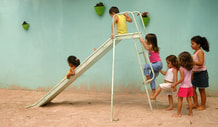 What would you say if someone told you that in any loving relationship, there are always two children who are in love? No, we are not talking of puppy love between cute 4 year olds. What we are really saying is that each of us as adults have our own inner child within us, and when in a loving relationship, what we are really seeking is for our inner child to be able to relate to the inner child of our beloved. The inner child is not merely a metaphorical child within us, but almost a literal one – it is like a younger version of us is very much there living inside us, carrying with it all the playfulness, the attention-loving, the creativeness of that child. Often, that child gets socialized out through our growing up years. We strive in growing-up to achieve a very different ideal of the cool, calm, collected adult who can make great decisions, is goal-driven, is purposeful and resourceful. Such adulting is seen as a goal in itself and given tags of ‘maturity’ and ‘objectivity.’ Of course, it is really important that we do become such strong adults, but it is so often at the cost of that inner child, who gets stifled and bottled up, forgotten like so much of the music and dance that we might have learned and enjoyed as a child. Somewhere between senior school and university, the child gets ignored or worse, actively shunned or repressed, or just retires to a corner. The playfulness and competitive joy of games and sports gets relegated to weekend hobbies to make space for the serious business of being an adult. Now, when two people fall in love, is it really the adults falling in love with each other’s eruditeness and ability to balance their accounts? Or are they falling in love with the undertones of mischief, fun, play and joy that are there if you scratch the surface of the seriousness of their education, jobs and social connectedness? Chances are that it is the two children within us connecting and falling in love. It happens quite unconsciously. Think of any romcom that you like – be it the When Harry met Sally types, or the Modern Family types, you are very likely to see the romance click through in those cracks when that inner child shines through the cultivated adultness. If you look at your own love, you would see it as well. When we do find someone that we really connect with and fall in love with, it is more often than not seeking to somehow make that inner child come alive again, but within the safety and security that the adulthood offers. The challenge is that often times, that connection again falls prey to the pressures of adult life and succumbs to the pressures of EMIs, Career progression and the such. But what if we could be conscious of our inner children? Wouldn’t it be amazing if we could let them live and love forever? As written for the New Indian Express  In the perfect world, kids treat each other with kindness, take turns, stand up to bullies and celebrate uniqueness. They also welcome outsiders to join their cliques until they are all one big happy family. Reality paints a different picture: kids fight, argue, make and break friendships, jealousies abound, tears are shed, personalities clash and parents draw battle lines to protect their children. As children begin their process of socializing, parents find that they are thrown into a brand new phase of adult socializing as well - a rite-of-passage they must endure! ‘…our close identification with our children means we can feel every trivial snub and jibe our kids experience all too keenly…’ Dr. Stephen Briers, ‘Playground politics for adults’ Here are some ‘Playground Issues’ you may be facing as a parent:
So. What can you do as a parent to survive playground politics?
Although there are no perfect answers, here are some guidelines that can help: 1. Think about what your child really needs:
Remember that your child will undergo some growing pain as he learns the ropes. This can be very hard to watch, but allowing him to experiencing these trials under your caring protection will equip him with lifelong skills. If you unable to handle a situation or it is getting out of hand, reach out to community resources/ friends/ a counselor for help. At the first instance, Cutting and self-harm may not necessarily mean the person is suicidal, though of course, it cannot be ruled out off-hand. Current thinking reflects that cutting behaviour, might be a way of expressing deep emotional pain that they don't have the full capacity to express, explore and process.
Usually, cutting is a secretive, and often obsessive behaviour that is in private. To know if a child might be cutting, look out for changes:: changes in clothing with a preference for full-sleeved shirts, increase in bathroom breaks, avoiding preferred activities and usual social groups or adopting small cliques that stay aloof from others. When as an adult you come across a teenage person cutting herself, the first thing is to know that this could be serious, and to alert the immediate family for possible counselling and mental health intervention. You can let the teenager know that you have become aware of this behaviour, your concern and your availability to discuss things if they want to, but please do not insist that they disclose. You can help by remaining calm and patient, much more than becoming anxious or panicking. What you may not want to do: 1. Don't make a hue and cry about it. Don't publicize it or make it a public knowledge. Certainly keep it confidential from other students and peers. 2. Don't demand that the child stop the practice, or threaten with adverse consequences 3. Don't probe, and don't assume highly traumatic events. Don't ask for any details on possible family issues, especially if you know of any dysfunction 4. Don't lecture them on how they should cope with life challenges, what is good for them or how they need to grow up 5. Don't make them feel guilty or shamed. Do not tell them they are hurting you, their family or school by this behaviour At the same time, this is difficult for an adult to witness and feel helpless. Please don't make it your mission to change things, and if the child is not willing to discuss with you, please don't take it as a personal disappointment or get frustrated. Even if the child doesn't want to discuss with you, you can still help by: 1. Keeping a watchful eye over the child, reducing alone time of the child 2. Helping the child engage with other activities (without making a project of it) 3. Staying open and available when the child chooses to try and express 4. Keeping the environment as predictable and friendly as possible What to do when the child starts to talk about it: When the child does begin to express, you can help by asking simple questions to try and understand. Gently look to help them find other resources for themselves, and to identify positive qualities about life and themselves. Try and maintain a non-judgmental attitude, and try to take an attitude that nothing is too shocking for you. You need not agree with them or feel the same way, but you can express that you understand how difficult it might be for them. A key benchmark is to see that the child is speaking much more than you. Even if the child is not talking, just being with them in comfortable silence can be great for the child. Please do not try and please the child so that she doesn't cut herself, as that might lead to manipulative behaviour. Is this the 'in' thing? Many children do pick up such behaviour from each other, popular fiction and the internet. Sometimes, they tend to form small groups which sustain each other, and that can have adverse effects on recovery as the support they got from each other when they needed it might be hard to give up. Look out if small cliques are getting formed with other similar people, and gently reduce grouping possibilities - not by policing them, but by increasing attractive options outside such group. Be discrete and take help when needed: Above all, your discretion, watchfulness, patience and availability matter. Please do consult a mental health consultant, or a psychiatrist when needed. They will work with the children and as the children learn more effective communication and coping tools, self-harming behaviour does tend to go away. |
InnerSight BloggersAjanta, Mahesh and other InnerSight counsellors and guest contributors are happy to share their thoughts here. Categories
All
Archives
September 2020
|

 RSS Feed
RSS Feed